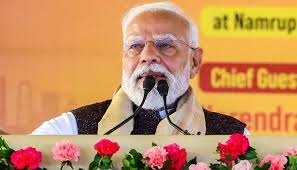New Delhi (Economy India): India’s wholesale price inflation eased sharply to 0.13% in June 2025, driven by a moderation in the prices of food items, fuel, and manufactured goods, according to the data released by the Ministry of Commerce and Industry on Monday.
This marks a continued downward trend in inflation, as the WPI stood at 0.39% in May 2025 and a significantly higher 3.43% in June 2024, highlighting the cooling of price pressures in the wholesale market over the past year.
Key Contributors to Decline
According to the official statement, the decline in wholesale inflation was primarily due to:
- A drop in food prices, especially for vegetables, cereals, and edible oils
- Softening fuel prices, reflecting lower international crude oil rates
- A continued reduction in the cost of manufactured goods, including textiles, chemicals, and base metals
“The moderation in WPI reflects easing supply-side pressures and a more balanced demand environment across key sectors,” said Dr. Ananya Joshi, Senior Economist at MacroSight Analytics.
Category-wise Inflation Breakdown
- Primary Articles: Price inflation stood at 2.7%, down from 4.1% in May
- Fuel & Power: Saw a contraction of 1.8% compared to 0.9% fall last month
- Manufactured Products: Inflation turned flat at 0%, from 0.1% in May
The food index within the WPI also saw a steep decline, which aligns with the downward trend witnessed in retail inflation indicators.
Comparison with Retail Inflation (CPI)
While WPI tracks price changes at the wholesale level, Consumer Price Index (CPI) reflects retail-level inflation. Notably, CPI for June was reported at 4.81%, still above the RBI’s 4% comfort zone, but stable compared to earlier months.
This divergence indicates that while input costs are stabilizing, end-user prices remain sticky — a factor the Reserve Bank of India continues to monitor closely.
Policy Implications
The latest WPI figures come ahead of the next RBI monetary policy review scheduled for early August. Although CPI holds more weight in policy decisions, a sustained easing in WPI inflation could support a more dovish tone from the central bank, particularly if global commodity prices remain subdued.
“Wholesale inflation is under control, but the central bank will likely wait for further data before considering any rate changes,” said Arvind Mehta, Chief Market Economist, Indic Research.
The sharp decline in wholesale inflation to 0.13% in June signals a cooling of price pressures at the producer level. While this offers some relief to businesses and policymakers, economists warn that risks like monsoon variability, global oil prices, and geopolitical tensions could impact future trends.
(Economy India)













